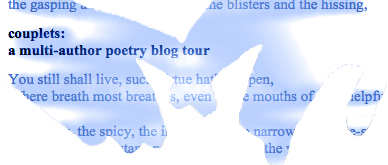Another Couplets interview, this time with Jericho Brown [note site auto-plays music], author of the gorgeous and brutal Please. Sample his poetry here [autplays music].
Joanne Merriam: What is your writing process?
Jericho Brown: I think of writing, first, as a process of listening to some series of sounds that enter my mind and, second, as a process of embodying those sounds. I try and leave as much as I can to instinct, intuition, and reflex—even in the final stages of revision. Because I’m so interested in both music and voice, I find myself trying to figure the personality of the sounds as I am composing. At some point in the writing of a first draft, I start to take on the characteristics of the voice asking to be channeled through words that convey what I think of as a necessary mixture of the sacred and the profane, the ironic and the ecstatic. An example of this might be something as simple as punching the computer if the voice is pissed to the point of violence.
I hardly feel that I have any control or power over the “story” that begins to emerge from a poem while composing it. I do my best writing when I am most vulnerable to the writing, when I allow for the construction of images and lines that, in the midst of composing, frighten me.
Joanne Merriam: You’ve talked a lot about the importance of music in your poetry, and of course Please contains so many poems that concentrate on music and musicians. What makes music so important to your work, and what has your love for music done for your poetry?
Jericho Brown: I’ve always wanted to see Wanda Coleman read and finally got the chance to do so a few months ago in Los Angeles. The experience was just as wonderful as I had expected, and after the reading, there was a Q&A. She answered one of the questions, “Art feeds art.†That about sums what I think of the relationship between popular music and contemporary literature.
I listened to Prince’s Purple Rain over and over when I was trying to figure out how to put the poems in Please in an order that would help to make them sing off of the page. I needed a model of genius to create what I wanted to be a work of genius. Nothing wrong with having the biggest goal possible.I’m trying to think whether or not there’s a music that hasn’t influenced my writing. Maybe I could say classical music hasn’t, but then I guess it wouldn’t really be classical music if that was true, and I have been known to be sappy enough to put Renee Fleming on when I feeling for purity and cleanliness and how they are or are not useful. With as far as sampling goes at this point, though, I can’t say there is a music that hasn’t influenced the way I think about my own work as an artist.
I think a reader should be able to hum along to the poem and able to sing the words of the poem aloud as if it is set to music. The poem itself should tell the reader the melody of itself by way of its combination of words. Yes, I believe this to be the case with free verse poems as much as formal ones.
Joanne Merriam: Do you think writing poetry helps you to understand more about yourself and the world, or is advancing as a poet more about learning how to communicate the things you already know?
Jericho Brown: I do think there’s something to the old adage of learning what you didn’t know you knew. Getting to this point in composition usually suggests to me that a poem is “done.†I also think the best poets have access to the entirety of themselves (their imagination, their moment, etc.) in terms of what might be used for content, voice, tone, form, or structure.
Joanne Merriam: What’s some writing advice you’ve received, that works for you?
Jericho Brown: Use condoms.

Check out more poetry-related interviews, reviews and guest posts at Couplets: a multi-author poetry blog tour.

